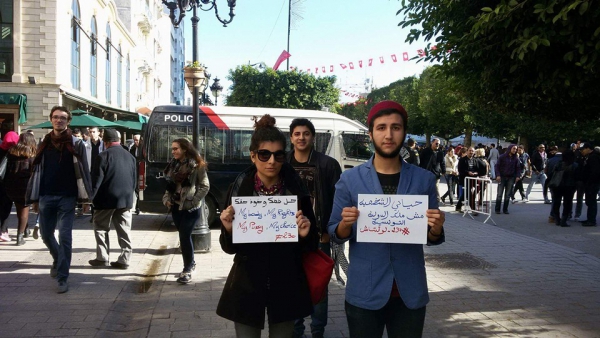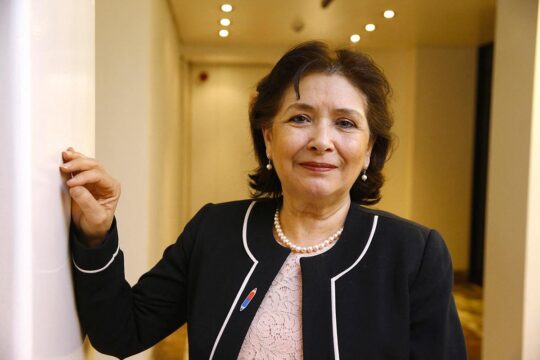Ahmed Ben Amor, vice-president of a Tunisian association defending gay rights, has the alert reflexes and hunted eyes of the persecuted, even when he is laughing. Since he got publicly involved with the Shams Association defending LGBT rights in Tunisia, this 19-year-old has lost everything: his family, his native home in the coastal town of Mahdia, his income, the studies where he was excelling, his security and his freedom to walk in the town. Today his friends take turns to shelter him in their homes in Tunis. But he is afraid for them because he gets innumerable death threats on his mobile phone and each time he goes out. So he moves frequently for security reasons, as his friends advise him. For this young man, the country has become an “open-air prison”. Although the police are supposed to protect people whose lives are in danger, Ahmed says they “leave members of the LGBT community to be punished by the public, when they are not themselves humiliating and attacking them, including sexually”. The police consider LGBT people to be second class citizens, he says, citing an old law that criminalizes homosexual practices.
Indeed, Article 230 of the Tunisian Penal Code, which dates from colonial times, provides for three years’ imprisonment for people “practising sodomy and lesbianism”.
A passion for music and writing
Ahmed nevertheless started out as a tranquil child, almost a prodigy, who was loved and cherished by his parents, both teachers. His father, a religious man, was also an imam at the local mosque. Ahmed began to discover his sexual preferences at age 15. At the same time he won a place at the Ecole pilote, the school that prepares the Tunisian élite of tomorrow, and went to pursue his studies at the high school in a neighbouring town. He was passionate about music, writing and literature. At 17 he started a blog under a pseudonym where he expressed his ideas, his dreams, recounted bits of his daily life, relayed quotes from things he had read. He received thousands of responses and started to realize how big was the LGBT community. The idea of starting an association to defend the rights of sexual minorities started to take shape amongst a small circle of people of which he was a leader. He felt fulfilled, life seemed to be smiling at him… and he was even in love.
Everything changed a year ago when he returned home for the holidays and his sister, who had always suspected him, discovered an intimate video on his computer. She alerted the parents.
Father’s anger
“When my father questioned me, I did not deny my homosexuality,” the young man recalls. “I wanted to stop pretending and assume my sexual identity fully. His reaction surprised me by its violence. He hung me from the ceiling for a day and a half while he and two of my uncles took turns to lash my body with a belt, and then when he was getting tired he stuck a knife in my leg. My mother and sister did not intervene, it was neighbours who heard my screams and came to my rescue, taking me to hospital and saving my life.”
Although he was in the emergency ward, Ahmed was fixed on one thing only: escaping the death sentence that his own family had pronounced on him. He left the hospital in a hurry, with torn trousers and a bloody face, and took refuge with friends in Tunis.
"My father cut off all support, so I worked the whole summer of 2015 to cover my expenses for the coming school year,” says Ahmed. “I was convinced that my only hope lay in my studies, they represented my dreams of autonomy and independence.”
Meanwhile, the Shams Association was launched in May 2015 and was not afraid to show its colours. In a country still deeply conservative at heart, Shams stirred controversy in the media and on social networks by announcing that it would defend sexual minorities. Ahmed committed himself entirely to the struggle. He and his friends called for Article 230 to be revised in the light of the new Constitution, under which the State has a duty “to protect the private life of citizens”.
Expelled from school for “sexual perversion”
When 22-year-old student Marwen was forced to submit to an anal test (supposed to “prove” homosexual practices) and was sentenced last September to a year in jail for homosexuality, it was the moment for the Shams association to revive calls for homosexuality to be decriminalized and to denounce this “shameful test”. Ahmed spoke for Marwen’s supporters in the media. When he returned to school he was insulted and expelled from class by his maths teacher and then expelled from school for “sexual perversion”. No other public or private school would agree to take this brilliant pupil who was only a few months away from getting his high-school diploma, probably with flying colours.
“I who was preparing to become a lawyer have lost everything,” says the 19-year-old. “I have nothing left to lose. Even if I were to be assassinated, there have been 15 homicides between 2011 and 2015, so maybe my death would serve a purpose. Only commitment to the association and the cause gives meaning to my life.”
But on January 4, the State legal services sent Shams notice of an order suspending its activities for 30 days. Lawyers say this is the first step towards ending the association’s activities altogether.
LGBT association under threat
A month earlier Abdellatif Mekki, member of parliament for the islamist Ennahdha party which is part of the governing coalition, deemed the association to be “dangerous” for “social peace”
"The government secretary-general Ahmed Zarrouk declared that the association did not legally exist, but doesn’t wanting to suspend it show that it is recognized?” says Ahmed. “The association has nothing to hide, it is perfectly in line with the September 2011 law on associations and with the Constitution which provides for individual freedoms and respect for privacy.”
The verdict has been postponed five times since January 21. The government, which faces pressure from international NGOs like Amnesty International to reverse the ban on Shams, is having trouble finding arguments to satisfy majority public opinion, which is opposed to LGBT rights.
Five years ago, the Tunisian revolution chased out a dictatorial regime and helped bring a series of political freedoms. As Tunisians celebrated their revolution on January 14 this year, Ahmed Ben Amor came out to demonstrate on Avenue Bourguiba, the main street of Tunis where memories of re-found freedom converge.
“I did that to mark the occasion, and to remind people that the LGBT community also participated in the revolution,” says the Shams vice-president. “And so it deserves its share of freedom and dignity.”
The date for the next hearing has now been set for February 16.






